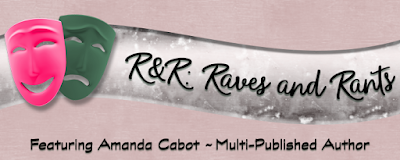R&R: Raves and Rants For September ~ Confusing Clauses

Confusing Clauses
 Last month I promised you that we’d be talking about clauses – not the ones who inhabit the North Pole – this month, and we will. Let’s start with a definition from my Merriam-Webster dictionary. According to M-W, a clause is “a group of words containing a subject and predicate and functioning as a member of a complex or compound sentence.” That’s fairly simple, isn’t it?
Last month I promised you that we’d be talking about clauses – not the ones who inhabit the North Pole – this month, and we will. Let’s start with a definition from my Merriam-Webster dictionary. According to M-W, a clause is “a group of words containing a subject and predicate and functioning as a member of a complex or compound sentence.” That’s fairly simple, isn’t it? Let’s start with an example from my current WIP. “Dorothy, who’d just finished setting glasses and silverware on each of the tables, laughed.” The words between the commas are the clause. They meet the M-W definition, because they have a subject – who – and a predicate – had just finished. Furthermore, if you remove them, you still have a complete albeit short sentence.

So what makes clauses confusing? Ambiguous antecedents. A clause refers to the noun immediately preceding it. In grammar-speak, that’s its antecedent. In my example, there’s no question that “who” refers to “Dorothy,” because “Dorothy” is the word immediately preceding “who.” But what about this sentence?
I added some chocolate powder from the cupboard, which I stirred around with a silver teaspoon.The noun immediately before the clause, its antecedent, is “the cupboard.” Did I stir a cupboard with a silver spoon? I don’t think so. One way to fix this error is to say, “I added some chocolate powder from the cupboard and stirred it with a silver teaspoon.” No ambiguity there. You’ll also note that there’s no dependent clause either.
A dependent clause, in case you were wondering, is one which cannot stand on its own. Yes, it has a subject and predicate, but it doesn’t make sense unless it’s connected to the main clause. In this case “which I stirred around with a silver teaspoon” is the dependent clause.
Let’s try another one.
Susan gripped the paperwork for the florist that she’d come to retrieve.Did Susan come to retrieve the florist? I don’t think so. Why not simply say, “Susan gripped the florist’s paperwork that she’d come to retrieve”?
The errors continue, and sadly all of these are ones I’ve found in published works.
An idea bubbled at the back of his mind that he was reluctant to voice.Was he reluctant to voice his mind? Not likely. This is another sentence that would benefit from restructuring. In this case, I’d recommend eliminating the clause and saying, “He was reluctant to voice the idea that bubbled at the back of his mind.”
By now, you’ve gotten the idea that you need to be careful – very careful – about avoiding ambiguous antecedents, so we’ll end with one final example.
He had singlehandedly driven the greedy vultures from the temple courtyard that preyed upon the worshippers who gathered there.How would you correct that sentence? Feel free to leave your answer as a comment. L.A. loves comments, and so do I.

You may have noticed that the title of this column is “Raves and Rants,” but so far we’ve only had rants. As a change of pace, next month I’ll rave about things I found done well. See you then!
~Amanda
 A lifetime of reading and writing, not to mention a host of teachers who believed that good grammar was one of the essentials of life, have given Amanda Cabot such firm opinions about the printed word that I asked her to share some with us in her Raves and Rants posts. Although her working career was in Information Technology, Amanda achieved her dream of selling her first novel before her thirtieth birthday and is now the author of more than thirty novels as well as a number of books and articles for Information Technology professionals.
A lifetime of reading and writing, not to mention a host of teachers who believed that good grammar was one of the essentials of life, have given Amanda Cabot such firm opinions about the printed word that I asked her to share some with us in her Raves and Rants posts. Although her working career was in Information Technology, Amanda achieved her dream of selling her first novel before her thirtieth birthday and is now the author of more than thirty novels as well as a number of books and articles for Information Technology professionals. Her most recent release is A Borrowed Dream, the second of the Cimarron Creek trilogy.

Find all of Amanda's books, newsletter info and social media links here.
Tweet
Published on September 09, 2018 23:30
No comments have been added yet.



